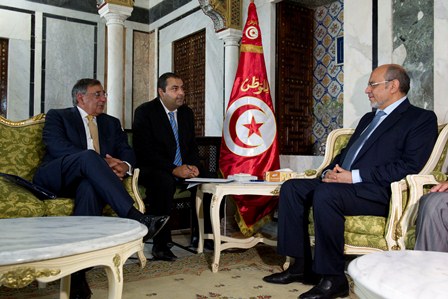
Tunisia was the birthplace of the earthquake that rocked the region and claimed a number of dictator rulers. The self-immolation of Muhammed Bouzizi led to mass protests that led to Zine El Alidine Ben Ali to flee the country. The ripples of this event are still being felt across the world and no one ever expected the Arab spring would engulf the whole region. January 2013 is exactly two years since the Arab spring began in Tunisia and whilst much has changed, what is difficult to avoid is how much has not changed and remains the same.
After decades of oppression an interim government replaced Ben Ali, and elections took place in October 2011. The country’s Islamic group Ennahda won the legislative polls, securing 90 out of 217 seats, and proceeded to form a coalition government with the secular parties that won the second and third-highest number of parliamentary seats. The Islamic tone to the elections and atmosphere was hard to avoid at the time and it was this underlying feeling that gave the Islamic party a clear victory which surprised many within the region and beyond. With a large mandate the Islamic politicians took up their positions of government and Tunisia waited for their values to be applies upon society.
Ennahda dominated the constituent assembly tasked with writing the nations constitution. The draft of the constitution was public in August 2012, and Ennahda made it clear after running on an Islamic ticket that it will not make the shari’ah the source of legislation in the new constitution and will maintain the secular nature of the state. Ennahda insisted that it will keep the first article of the 1956 constitution in the new basic law. The article enshrines the separation of religion and state, stating that: “Tunisia is a free, independent and sovereign state, its religion is Islam, its language is Arabic and it is a republic.” “We are not going to use the law to impose religion,”[1] Ennahda’s leader Rachid Ghannouchi told journalists after the Islamic parties constituent committee voted to maintain the constitutional article by 52 votes to 12. The article, he added, “is the object of consensus among all sectors of society; preserving Tunisia’s Arab-Muslim identity while also guaranteeing the principles of a democratic and secular state.”[2]
Ennahda founded in the 1980s on the model of the Egyptian Muslim Brotherhood, over the past two decades has become more comfortable with the ideas of secularism, to the point that it now has more in common with secular parties than an Islamic one. It has become similar to the AKP in Turkey which is Islamic in name only.
The Ummah of Tunisia voted in the Islamic party due to their Islamic sentiments. Ennahda have made it perfectly clear now they are in power, that they have no plans to implement Islam. Tunisia has been the only country that witnessed the ousting of its leader and openly declare that it will maintain the existing system, albeit with some cosmetic changes, but Islam will play virtually no role. Ennahda’s leader, Rachid Ghannouchi, explained with regards to establishing the Khilafah after its electoral victory: “Definitely, we are a nation state. We desire a state for Tunisian reforms, for the Tunisian State. As for the issue of the Khilafah, this is an issue that is not one of reality. The issue of today’s reality is that we are a Tunisian State that desires reform, so that it becomes a State for the Tunisian People, not against them.”[3]
Ennadah likes its partners in Egypt after emerging victories have done everything within their capability to maintain the existing system. Calling themselves an Islamic party they have been very clear that Islamic rule cannot work in today’s world, Rachid Ghannouchi, the group’s leaders said the Islamist party would not “introduce ambiguous definitions into the constitution that risk dividing the people”, adding that “many Tunisians do not have a clear image of sharia and erroneous practices in certain countries have aroused fear.”Whilst many in Tunisia sacrificed their lives for change in the country, once in power Ennadah has refused to implement Islam and they should take notice that the ummah drove Ben Ali out of the country for his treachery, the ummah have shown they no longer fear the regime and if Ennadah do not live up to their promises they may also become part of history as Ben Ali is now.
Adnan Khan
[1] Tunisia’s Islamists rule out sharia in constitution, France 24, March 2012, retrieved 23 September 2012, http://www.france24.com/en/20120328-tunisia-islamists-rule-out-sharia-constitution-ennahda
[3] Interview with Rachid Ghannouchi, France 24, 13 November 2011, retrieved 11 November 2012, http://alhittin.com/2011/11/13/rashid-al-ghannushi-rejects-the-idea-of-khilafah-wants-reforms/
